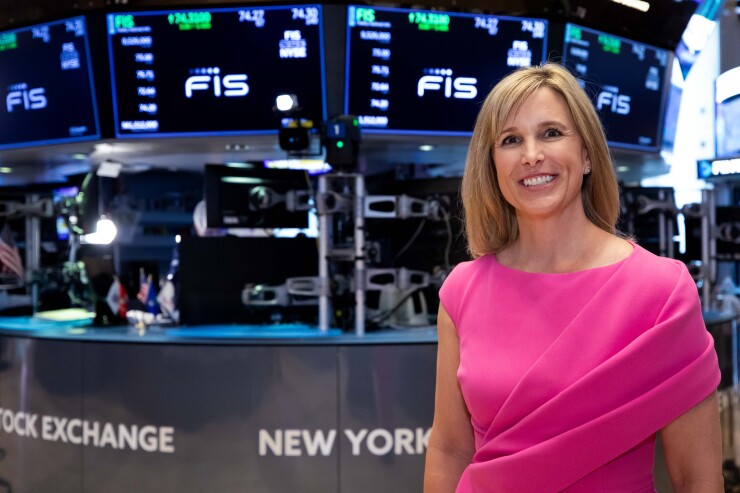
FIS has a message for its bank customers: We care about you again.
The software giant, best known among banks for its core software that powers deposits and all other functions, veered into payments when it bought Worldpay in 2019. But since announcing last year that
"We lost our focus on serving our banking clients," said Stephanie Ferris, who
The turnaround has occupied the first year of Ferris' time as CEO, starting when she
Now, to bring banking back to the center of her strategy, she plans to work faster. "If you buy a product or service from us, we are focused on implementing and delivering it as quickly as possible," Ferris said, "really focusing on what I would call day-to-day execution."
FIS already provides banking cores to some 60% of large and regional banks in the U.S, and is also pouring money into upgrading other products, which "really puts them in a strong competitive position," said Vasu Govil, an analyst at Stifel's KBW Equity Research. "FIS' underperformance in the banking business in the last year or two was mostly related to execution issues more than a change in the competitive positioning of the business and it's good to see the strides the new management team has made in fixing those issues particularly around sales processes and incentivization, which is yielding positive momentum in new sales," she said.
FIS also has the ability to approach the banks that are already its customers and cross-sell software for payments and digital banking, both faster-growing areas, she said.
The Jacksonville, Florida-based company is leaning on its cloud-based software and long list of clients that includes the biggest financial institutions. "We have 1,500 salespeople around the globe that can sell and distribute our products, and we serve the largest banks, capital market firms, private equity [firms] and corporates," Ferris said. "So when we think about selling and servicing, we can do it to our existing customers, as well as new customers."
In their presentation to investors, FIS executives noted an opportunity to bring in as much as $500 million in revenue for the banking unit if customers with installed core systems could be convinced to let FIS also process their payments, as 70% of banking core customers already do. The company is updating software including its modular Modern Banking Platform line, which has 12 live clients including five of the 20 largest U.S. banks, wrote Kenneth Suchoski, an analyst at Autonomous Research, in a research note to clients.
"The sales team continues to gain momentum and FIS initiatives are paying off, as sales productivity is up 15% in 2023 and sales margin is up [approximately] 110 basis points over the same period, as the company has armed the sales team with additional tools/data and is focusing on higher margin business," he wrote.
Not all banks are happy with the cores they use. FIS' turn back toward banking comes as many banking customers are working, and often struggling, to migrate onto cores that allow for APIs and integration with fintech vendors. The process of migrating to a new core can take years regardless of which vendor the bank is using;
Banks, especially community banks, have long complained that FIS and its rivals Fiserv and Jack Henry, which together supply most of the industry's core software, wield their power unfairly through long-term contracts that lock in banks without flexibility. Often, they turn to regulators:
Ferris noted that FIS most often serves larger banks, not MDIs, which are typically smaller. But for customers of all sizes, FIS does offer open APIs that allow banks to use the FIS core and another vendor's service for digital banking, for instance, "if we're not delivering a fast enough digital product for them and they're frustrated with us," she said.
Another new initiative announced last week is a program called Atelio to connect fintechs to banks and other financial institutions so they can offer embedded finance. It's a strategy that makes sense if FIS can do it right, Suchoski wrote.
"As companies look to embed financial services into their offerings, FIS, with its breadth of products, should be well positioned here," he wrote. "That said, this will be a show-me story and we worry that if FIS is more of a back-end provider (i.e., they don't own the relationship with the end customer) then take rates and economics could be quite small, as we've seen back-end processing get competed away over time."
For the first quarter, FIS had revenue of $2.5 billion in the segments it's keeping after the Worldpay sale, up 3% from last year's quarter. The company earned $17 million in profit this quarter compared to $96 million in the first quarter of 2023, but said the comparison wasn't meaningful because of the changes in its business. For the banking unit, revenue in the first quarter was up 2% over the prior year's quarter. FIS also said it plans to save $790 million in operating expenses through 2026 and buy back $4 billion worth of its shares this year.






